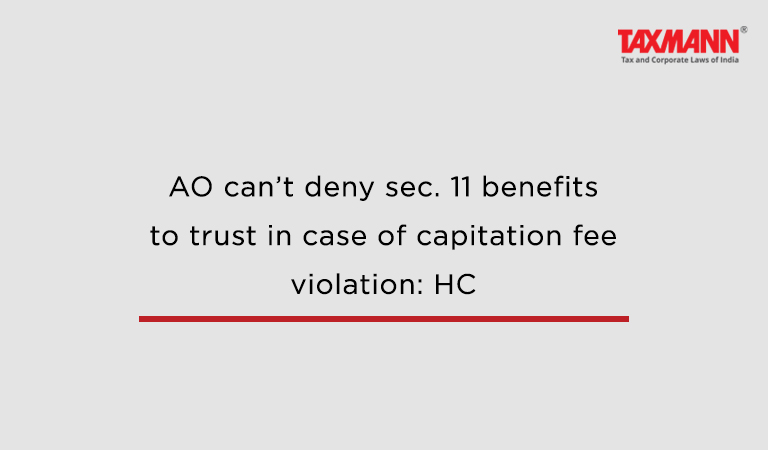AO can’t deny sec. 11 benefits to trust in case of capitation fee violation: HC
- News|Blog|Income Tax|
- 2 Min Read
- By Taxmann
- |
- Last Updated on 7 February, 2023

Case Details: Kammavari Sangham v. DDIT (Exemptions) - [2023] 146 taxmann.com 367 (Karnataka)
Judiciary and Counsel Details
-
- P.S. Dinesh Kumar & Umesh M. Adiga, JJ.
- V. Chandrashekar & M. Lava, Advs. for the Appellant.
- E.I. Sanmathi, Standing Counsel for the Respondent.
Facts of the Case
Assessee, a trust, was running an educational institute. During the relevant assessment year, assessee received money as capitation fees (donation) and disclosed the same in the Income and Expenditure account. The assessee claimed exemption under section 11 with respect to the capitation income while filing return of income.
During the assessment proceedings, the Assessing Officer (AO) proclaimed that the said capitation fees were received by the assessee in violation of the Karnataka Educational Institution Act, 1984, and denied the exemption under section 11.
On appeal, CIT(A) upheld AO’s order which was subsequently ratified by the Tribunal. The matter then reached the Karnataka High Court.
High Court Held
The Court held that the person giving voluntary donation can make such contribution either with specific direction or otherwise. Section 11 deals with the donations made with specific directions. The section specifies that the donations made with any specific direction shall form part of the corpus. However, no such provision has been prescribed for the donations made without any specific direction.
In this particular instance, the exemption under section 11 was denied on the fact that the donations received are not voluntary in nature and thus in the violation of Karnataka Educational Institution Act, 1984.
The Court held that the AO cannot deny the benefit under section 11 until the registration certificate is cancelled. This benefit can be claimed by the assessee as long as the registration is in force. The contention that the capitation fees received violates other Act cannot be a basis for disallowance under the Income Tax Act. It is a matter of consideration under the above-mentioned Act which needs to be considered by the appropriate authority under that Act.
Since the registration certificate was in force, exemption under section 11 cannot be denied to assessee-trust.
List of Cases Reviewed
-
- Dy. DIT (Exemptions) v. Kammavari Sangham [IT Appeal Nos. 206 & 207 (Bang.) of 2014 and 1099 (Bang.) of 2015, dated 17-6-2016] (para 17) reversed.
- CIT v. Balaji Educational & Charitable Public Trust [2015] 56 taxmann.com 182/231 Taxman 267/374 ITR 274 (Mad.) (para 14) followed.
List of Cases Referred to
-
- CIT v. Balaji Educational & Charitable Public Trust [2015] 56 taxmann.com 182/231 Taxman 267/374 ITR 274 (Mad.) (para 5)
- DIT v. Kammavari Sangham [IT Appeal No. 421 of 2013, dated 16-12-2015] (para 8)
- DIT (Exemption) v. Karnataka Badminton Association [2017] 80 taxmann.com 138/[2015] 378 ITR 700 (Kar.) (para 8).
Disclaimer: The content/information published on the website is only for general information of the user and shall not be construed as legal advice. While the Taxmann has exercised reasonable efforts to ensure the veracity of information/content published, Taxmann shall be under no liability in any manner whatsoever for incorrect information, if any.

Taxmann Publications has a dedicated in-house Research & Editorial Team. This team consists of a team of Chartered Accountants, Company Secretaries, and Lawyers. This team works under the guidance and supervision of editor-in-chief Mr Rakesh Bhargava.
The Research and Editorial Team is responsible for developing reliable and accurate content for the readers. The team follows the six-sigma approach to achieve the benchmark of zero error in its publications and research platforms. The team ensures that the following publication guidelines are thoroughly followed while developing the content:
- The statutory material is obtained only from the authorized and reliable sources
- All the latest developments in the judicial and legislative fields are covered
- Prepare the analytical write-ups on current, controversial, and important issues to help the readers to understand the concept and its implications
- Every content published by Taxmann is complete, accurate and lucid
- All evidence-based statements are supported with proper reference to Section, Circular No., Notification No. or citations
- The golden rules of grammar, style and consistency are thoroughly followed
- Font and size that’s easy to read and remain consistent across all imprint and digital publications are applied



 CA | CS | CMA
CA | CS | CMA
